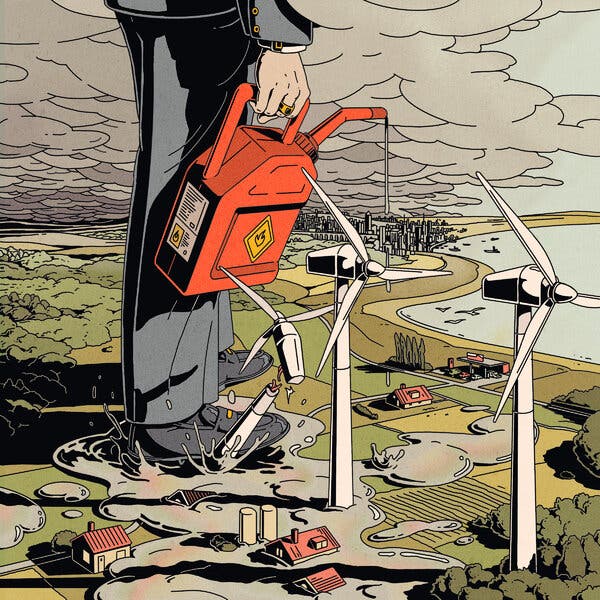In 1982, researchers working for major oil companiesShell and Exxon informedcorporate management of what they referred to as the“clear scientific consensus”that ongoing combustion of petroleum products would increase worldwide temperatures, with“catastrophic” (their word) consequences.
We now understand that theycorrectly forecasted climate change that we see today.
For a short time, leadership in the fossil fuel sector took a moment to reflect on the effects of their business approach, even implementingequipment on supertankersto track fluctuations in carbon dioxide levels across the oceans.
But then something changed.
The leaders of the fossil fuel industry deliberately chose todestroy America’s confidence in scientific facts and information.
While the industry was strengthening oil production facilitiesIn the face of severe storms and rising sea levels, they also worked to erode public trust in science and scientists.
To discover the method, Big Oil turned to companies that had already achieved success — such as Big Tobacco.
The main strategy was to introduce uncertainty regarding climate science, and scientific knowledge as a whole, into the public’s perception.
A document from the Brown & Williamson tobacco company revealed the approach,“Skepticism is our offering, as it is the most effective way to rival the‘body of fact’ that resides in the perception of the average person.It is also the method of creating debate.
Fossil fuel companies adopted a strategy developed by the PR firm Hill & Knowlton for the Tobacco industry — tocause people to question what is real, and forget what is not.”
This detailed and psychologically advanced initiative, based on the latest methods of influence, has been distributed via print, television, radio, and more recently, through strong internet algorithms, to exploit vulnerabilities we might not even be aware of.
Major oil companies distributed fragments of false information, designed for a media figure to recite quickly, yet could require an actual scientist several hours to analyze.
Media outlets were more than pleased to enhance “the other side”regarding climate change — giving public relations representatives the same status as credible scientists. Creating a false “debate” resulted in less pressure on journalists to fulfill their role and uncover the truth.
The strategy of the fossil fuel industry proved successful. This summer, we encountered the outcomes in news headlines almost daily.
Last week, four “1-in-1,000 year” weather occurrences affected different areas across the United States.
Michigan is once more struggling this summer, as even “God’s Country” in the northern part is covered in harmful wildfire smoke.
Efforts to address climate change have been postponed for many years, with atmospheric changes setting in motion processes that will alter the Earth for the next 10,000 generations. However, there has also been unintended harm.
When they targeted the credibility of the United States’ scientific top achievements, specifically NOAA (National Oceanic and Atmospheric Administration) and NASA — they also undermined the American public’s respect for the entire scientific field.
Now, with the fossil fuel industry firmly in charge, we are witnessing a complete dismantling of the scientific framework that positions America on a path to anidiocracy. Not just weather forecasters and climate change modelers— but scholars throughout therange from biology to physics.
Younger scientists in particular are impacted— not only agency researchers, but also graduate and even undergraduate programs that help build the pathway for upcoming researchers.
Just as the recent Texas flood impacts were worsened bydismissals at the National Weather Service, public health has been undermined bythe emergence of skepticism towards immunizations, and now the rise of the nation’smost well-known anti-vaccine advocate to a cabinet position.
Not surprisingly, our country is currently experiencing the worstmeasles outbreak since the disease was declared eliminated in the US 25 years ago, and with reduced vaccination rates in several states, specialists are concerned about aresurgence of diseases such as Polio.
In 1995, astronomer Carl Sagan clearly foresawthis instant when he wrote “I have a feeling about an America in the time of my children or grandchildren — when the United States becomes a service and information-based economy; when almost all the manufacturing sectors have moved to other nations; when powerful technological capabilities are held by a small number of people, and no one advocating for the public’s interests can understand the problems.”
He cautioned that Americans “unable to tell the difference between what feels good and what is true” were ready for “a form of celebrating ignorance.”
Under Trump, and Project 2025, Sagan’s worst fear has come true.
Peter Sinclair is a resident of Midland and a globally known videographer who focuses on climate change and sustainable energy topics.






